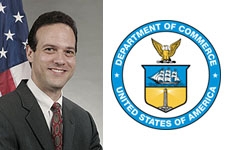National Institute of Standards and Technology
-
This week, host Jason Miller talks with Simon Szykman, the new CIO at the Department of Commerce. September 16, 2010
September 16, 2010 -
Learn more about what the 500-page guide details
September 14, 2010 -
Learn more in today\'s Cybersecurity Update
September 14, 2010 -
Anti-US hacker takes credit for \'Here you have\' worm
September 13, 2010 -
September 22nd at 11 AM Data Loss Prevention (DLP) is receiving significant attention within the information security community as individuals and organizations realize the importance of managing and protecting sensitive information. The impact of a data breach can be significant, resulting in lost productivity, failed audits, and negative press exposure. This session will review the benefits of identity-aware Data Loss Prevention and how these integrated solutions can help reduce IT risk, automate key security processes and enhance overall compliance posture.
September 07, 2010 -
Agencies and vendors soon will be able to submit cloud-based products and services to be certified and accredited once and be available for use by all of government. Version 2 of the FedRAMP security controls should be ready in the next few weeks. Cloud working group still must address several questions about the approval process.
August 25, 2010 -
Learn more about the Internet Policy Task Force
August 24, 2010 -
Has there been a break in the cloud? Symantec recently released its 2010 Break in the Clouds Report, which shows that many CIOs and CISOs in the federal government still have real concerns about security.…
August 19, 2010 -
Ari Schwartz is leaving the Center for Democracy and Technology after 13 years to join the National Institute of Standards and Technology as a senior Internet policy advisor. He explains the decision to become a fed.
August 12, 2010 -
This week, we bring you a special treat — an extended conversation with Mark White, a principal with Deloitte Consulting LLP who works with both the firm’s Federal and Technology practices. He is also the…
August 09, 2010 -
It\'s a saying many of us have grown to hate, but Apple\'s iPad really is being tested to see if it\'s \"good enough for government work.\"
August 09, 2010 -
Learn more in today\'s cybersecurity update.
August 06, 2010 -
Long-time privacy and cybersecurity expert to join the government to work on similar issues. EPA\'s Lisa Schlosser also takes on a new role at her agency.
August 06, 2010 -
August 12th, 2010 at 11 AM How does one assure trust in Cyberspace? As citizens, government, and business enterprise increase the amount of information that is shared online, fundamental questions arise around security requirements, data and identity management, and infrastructure. Trusted online environments can reduce costs, expand services, and are critical to protecting how, and to whom, information is shared. Securing identities in transactions is an essential component to building trusted online systems and a critical priority for both business and government. As online information sharing and collaborative services evolve between people and technologies, will trust emerge as the next \"Killer App\"?
August 02, 2010



